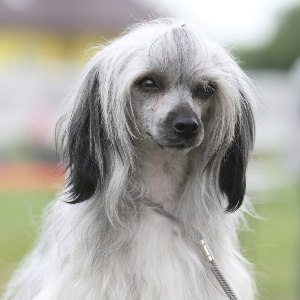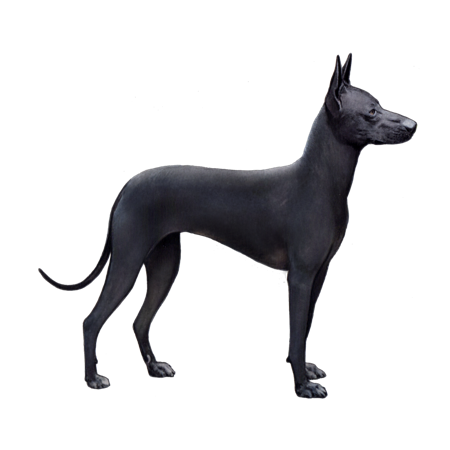
Chinese Crested
The Chinese Crested is a sweet, devoted, and affectionate dog. Cresteds do well in apartments and other small-space dwellings thanks to their petite size. And their unusual appearance often earns the attention of strangers on walks.
Interested in discovering if your dog is a Chinese Crested?
Check out Wisdom Panel's DNA tests.

Chinese Crested Traits
General Appearance
The Chinese Crested makes for a small companion with a graceful and elegant look. These dogs have pointed muzzles and Poodle-like faces.
Coat and Coloring
The Chinese Crested comes in two varieties: powderpuff (i.e., soft, straight coat) and hairless (i.e., silky hair on the head, tail, and feet). The breed may be a wide range of colors—including apricot, black, chocolate, white, silver, pink, and red. Cresteds may also have white or palomino markings.
Distinctive Physical Traits
A delicate bone structure and fluid movements distinguish both varieties of the Chinese Crested. They have slightly rounded but lengthy heads, carved cheeks, and long, narrow, close-toed feet.
Chinese Crested Temperament
The Chinese Crested is a feisty, attentive breed with a warm personality. These dogs are incredibly loyal to their people and excellent with children. Still, small kids must be supervised in the company of any dog (for mutual safety). This breed is usually friendly toward other pets, too.
Though Cresteds generally don't bark much, they do love digging. They also crave attention and cuddling, so it's best not to leave Chinese Cresteds alone for long periods.


Chinese Crested History
Experts debate the origin of these energetic dogs. Most agree that the Chinese Crested is a long-established breed, dating back to 16th-century China. But while some insist that the breed shares a common ancestry with the Mexican Hairless dogs, others believe it originated in Africa.
Though the origins of the Chinese Crested may be questionable, the breed's popularity is not. Famous entertainers like Gypsy Rose Lee and her sister, actress June Havoc, have owned and promoted the breed.
The Chinese Crested received official American Kennel Club recognition in 1991.
Chinese Crested Care
Nutrition
The Chinese Crested needs a high-quality pet food that is age-appropriate and formulated for small or toy breeds.
Given that this breed is prone to obesity, it's important to monitor the amount of food you give your Chinese Crested. Reduce portions or restrict calories if your pup gains weight. Also, remember that giving too many treats in addition to regular meals can contribute to obesity and other health issues.
Grooming
The Chinese Crested's skin is prone to irritations, allergies, and even sunburn. So, gentle grooming—using skin products specifically designed for the breed—is necessary.
Daily brushing will keep the powderpuff Chinese Crested's coat fluffy. But understand that the breed's coat is not like that of most other dogs. The undercoat is shorter than the overlay, which is the opposite of most breeds with hair. On the upside, this trait makes brushing easier. On the downside, the coat mats quickly.
Exercise
You can satisfy the Chinese Crested's need for physical activity with daily short walks and playtime in the backyard. Outdoor exercise is good for this breed, but remember that the hairless variety has exposed skin. So, either apply sunscreen or dress your dog in protective clothing. If you use sunscreen, be mindful of ingredients, and observe your Chinese Crested for allergic reactions.
Cresteds excel in dog sports such as agility, flyball, and obedience training—all of which provide physical and mental stimulation. These resilient little dogs enjoy challenges and can be very competitive in canine sports.
Training
Though Chinese Cresteds are highly intelligent, they require gentle handling, positive reinforcement, and patience when training. Use treats as a steady motivator, and your dog will cooperate with the lesson.
Early socialization and puppy training will reduce timid or aggressive behavior. As a result, your Chinese Crested will be more comfortable around strangers and other animals.

Chinese Crested Genetic Health Conditions
-
Canine Multiple Systems Degeneration (Discovered in the Chinese Crested Dog)
Canine Multiple Systems Degeneration (CMSD) is a neurodegenerative disorder that has an early onset and progressively affects walking and motor skills. The associated genetic variant has been identified in the Chinese Crested Dog.
-
Chondrodystrophy (CDDY) and Intervertebral Disc Disease (IVDD) Risk
Chondrodystrophy (CDDY) is a skeletal disorder characterized by shortened limbs and abnormal early degeneration of the spinal discs, or intervertebral disc disease (IVDD), which predisposes to disc herniation.
-
Neuronal Ceroid Lipofuscinosis 7
Neuronal Ceroid Lipofuscinosis 7 (NCL7) is a progressive disease affecting behavior, movement, and vision, with a risk of epileptic seizures in later stages.
-
Primary Lens Luxation
Primary Lens Luxation (PLL) is a condition that can cause the lens of the eye to become loose and eventually displace. The disorder is caused by degeneration of the fibers that hold the lens in place.
Knowing if your Chinese Crested is a carrier or at-risk for these conditions can help you and your veterinarian plan for your pup’s lifelong care. With Wisdom Panel™ Premium, you can get results for over 200 genetic health tests.
Breed Group
Terrier
The Terrier Group ancestors were bred to hunt and kill vermin. They are often characterized as feisty and energetic dogs whose sizes range from fairly small to much larger.
Resources
https://www.akc.org/dog-breeds/chinese-crested/
Reviewed July 26, 2020 by Annette Louviere, DVM





















































